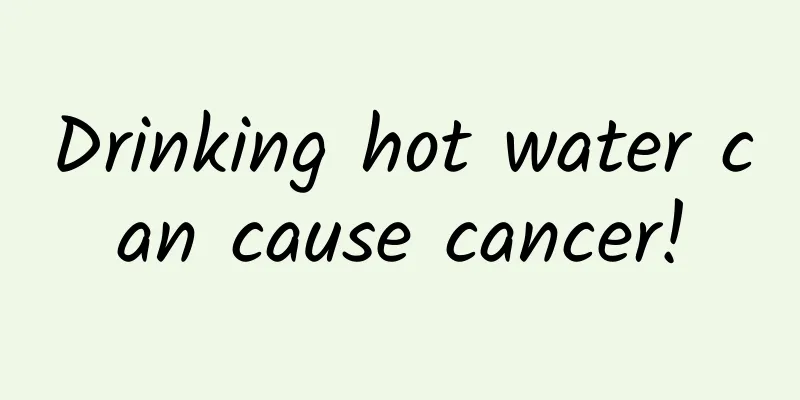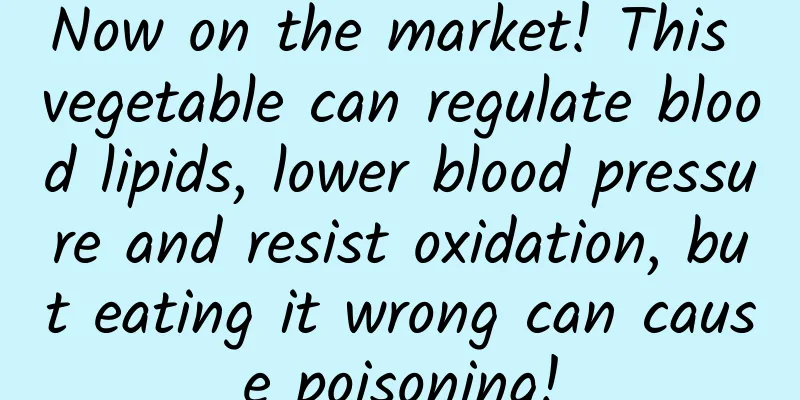Drinking hot water can cause cancer!

|
When the weather gets cold, there’s one thing you can’t live without: hot water. Chinese people have a special attachment to drinking hot water: Have a cold? Drink more hot water! "Sweat more and you will get better soon!" Have menstrual pain? Drink more hot water! "It's warm and soothing..." Have stomach discomfort? Drink more hot water! "It's so comfortable to feel warm in my stomach!" In the eyes of many people, hot water seems to be a panacea. No matter what kind of illness you have, drinking more hot water can solve most of the problems. Hot water, with its unchanging attitude in the face of ever-changing situations, has firmly occupied the top position of the cheapest "health care product". However, as early as 2016, the International Agency for Research on Cancer (IARC) under the World Health Organization (WHO) pointed out in a carcinogen assessment report that drinking hot drinks above 65°C has a carcinogenic risk and listed it in the Class 2A carcinogen list. Image provided by the hospital In fact, the hot drinks here do not specifically refer to hot water, but all hot foods that people eat, including: hot tea, hot pot, malatang, etc. Studies in China, Turkey and South American countries have found that people in these regions are accustomed to drinking water, coffee and tea above 65°C or 70°C, and their risk of esophageal cancer also increases. Data from the World Health Organization show that China's esophageal cancer incidence and mortality rates account for more than half of the world's total, which is related to the fact that we like to eat food while it's hot, drink hot water, and eat hot food. In 2022, the research results of Chinese scientist Li Zhiyuan's team found for the first time that the "heat activation temperature" is 54°C, which is lower than the dietary temperature of many people and far lower than the risk temperature of high-temperature diet. A doctor from Zhejiang University Second Hospital said that research has repeatedly warned the public that eating too hot food for a long time may greatly increase the risk of cancer. Why does drinking hot water cause cancer? The key lies in the temperature, because when we drink hot drinks, it will damage the mucous membranes of our mouth and esophagus. These mucous membranes are very fragile and can only withstand temperatures of 50-60°C at most. Once the temperature exceeds 65°C, they will be burned. Occasional burns are okay because the mucous membranes have a certain repair ability. However, if you drink hot drinks for a long time, the mucosa will be in a repeated process of "damage-repair-damage-repair" for a long time, which will cause an increase in abnormal "atypical" cells and eventually lead to the appearance of esophageal cancer. Especially in winter when the temperature is low, people prefer to eat hot porridge, hot soup noodles and other foods, and drink hot water, hot tea and other beverages, which are more likely to cause a high incidence of esophageal cancer. It is worth noting that people who have the habit of smoking and drinking and often drink hot tea above 65°C have a 5 times higher risk of esophageal cancer than ordinary people, because hot tea will reduce the esophagus's ability to resist alcohol and nicotine toxins. Even if you are lucky and don't get cancer, drinking hot drinks for a long time can cause problems such as oral ulcers and esophageal ulcers. What does 65℃ mean? Someone did a small experiment. Under the condition of room temperature of 25℃, boiling water poured into a glass needs to be left for 15 minutes, and porridge just out of the pot needs to be left for 10 minutes before the temperature drops to 65℃. Of course, everyone has different perceptions of temperature. Many people say that 70 degrees is acceptable, and some even drink water of similar temperature regularly. Many of our daily foods, especially those with a lot of hot water, are basically above 65 degrees Celsius after cooking, or even within a few minutes after being taken out of the pot. So a temperature of around 65 degrees Celsius is not as hot as we think. How to eat healthy? Some friends may ask after reading this: "It's over! I love eating soup so much, I won't get cancer, right?" Avoid "carcinogenic eating habits" Compared to the mouth, the esophagus is not as sensitive to temperature. So some people will swallow the food immediately after their mouth is burned, thinking that it is not hot and that they are very "tough". Little do they know that this practice is more harmful to the esophagus and has "hidden" effects. This is the most likely way to cause cancer. Tips for avoiding cancer-causing temperatures 1. Let it dry for a few minutes before eating; 2. Before eating, take a sip with your lips and test it. If it doesn’t feel too hot, it’s almost done. 3. Eat in small bites, don’t swallow it all at once; 4. If your mouth is hot, be sure to spit it out, don’t swallow it. The following behaviors should be avoided: Not only should you avoid "eating too hot" and "eating too fast", you should also avoid the following behaviors! 1. Often eat heavy flavors and like spicy food, such as spicy hot pot, spicy hot pot, etc.; 2. Like to eat pickled and fried food; 3. Long-term smoking and drinking; 4. Eating stale or moldy food. In short, food should be warm but not too hot. A reasonable diet and safe and hygienic diet are the cornerstones of maintaining health. |
>>: [Medical Q&A] Are tinea corporis and eczema the same thing?
Recommend
How is fallopian tube obstruction detected?
The fallopian tube is a channel for transporting ...
How to remove breast calcification
For female friends, breast health is very importa...
When can a pregnant woman wash her feet?
We all know that it is very important for women&#...
Can I inject hyaluronic acid during my period?
Nowadays, whether it is in many beauty salons or ...
What causes vaginal itching in women?
Nowadays, many women have vulvar itching. Because...
Can I take Ginseng Guipi Pills during menstruation?
Ginseng Guipi Pills are a traditional Chinese med...
Pit and fissure sealing to prevent tooth decay
Creation and dissemination of oral science works ...
What is the best time to have an abortion?
Sometimes a woman's body is not suitable for ...
Can I get pregnant if I have irregular menstruation?
It is possible to get pregnant with irregular men...
What medicine should women take for blocked meridians?
Nowadays, many people have the problem of blocked...
What is the cause of sticky and stringy menstruation?
Thick menstrual blood that is difficult to discha...
Is it normal for a woman to be infected with HPV?
There is a kind of viral infection that is basica...
Why is a woman's lower body red, swollen and itchy?
When swelling occurs in the private parts, most w...
Second degree cervical erosion surgery fee
Although cervical erosion sounds very scary, in f...









